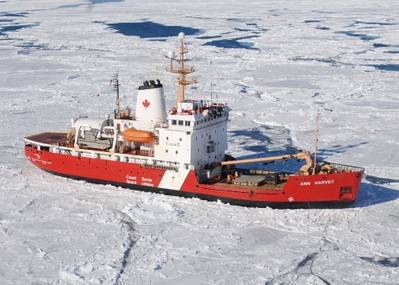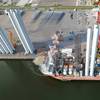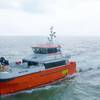Canada's Coast Guard mulls its options as it awaits the arrival of replacement icebreakers to its aging fleet.
In order to maintain open tracks through ice, escort ships, free ice-beset vessels, break up ice in harbors, resupply isolated northern communities and protect them from flooding, the Canadian Coast Guard operates a fleet of 14 vitally important icebreakers, many of which are nearing the end of their operating lives. Some, built as far back as the 1960s and 1970s, have already exceeded their intended years of service.
As the fleet continues to age, the Coast Guard is forced to rely on maintenance, repairs and modifications to help keep its older vessels operational, though it often comes at the cost of removing them from duty, sometimes for months at a time.
With replacement icebreakers on the horizon, being built in Vancouver Shipyards (VSY) under the National Shipbuilding Strategy (NSS) and expected for delivery in the 2020s, Canada’s federal government is in the meantime seeking input from the marine industry on options for filling the Coast Guard’s interim needs.
“The NSS is a long-term approach to shipbuilding,” said Judy Foote, Minister of Public Services and Procurement Canada (PSPC). “Pending the arrival of new vessels being built under the strategy, we recognize the Canadian Coast Guard may require interim solutions.”
PSPC therefore issued a request for information (RFI) on behalf of the Canadian Coast Guard, which in addition to seeking input on icebreaking services, also asks for input on bringing the Coast Guard’s capacity to tow oceangoing vessels to world-class standing as part of efforts to strengthen its marine pollution response capability.
“We are exploring options to fill potential capacity gaps in the fleet to ensure that the Coast Guard continues to provide these critical vital services for people who live and work on our waterways. We are also improving marine safety and tow capability which are key elements of the Government of Canada’s Oceans Protection Plan,” said Dominic LeBlanc, Minister of Fisheries, Oceans and the Canadian Coast Guard.
Industry responses to the RFI will inform Coast Guard decisions on how to best fill potential capability gaps and ensure continuity of service.
“Engaging in dialogue with industry will help determine the best way to gain economic benefits from procurement,” said Navdeep Bains, Minister of Innovation, Science and Economic Development. “Through this RFI we will get valuable advice on how to optimize procurement practices to drive job creation and foster a more prosperous middle class.”
“Our government is committed to equipping the men and women of the Canadian Coast Guard with the ships they need to serve Canadians,” Foote said.













